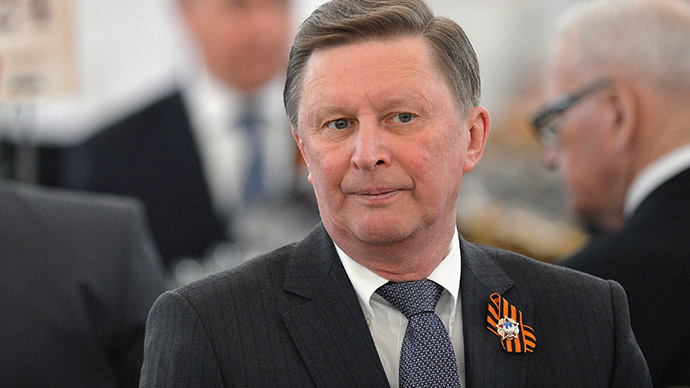Western media bashing of Putin’s circle boomerangs – pres admin head to RT

Recent accusations of corruption flung by Western media at those close to Vladimir Putin are desperate attempts to get at the Russian President, the head of the presidential administration Sergey Ivanov told RT.
Ivanov says he has been following US and British newspapers for over three decades now, and has observed a certain trend in the last “couple of years”: “I noticed there’s a sort of blacklisting process... mostly in the American and British papers which I respected for quite a long time. I often read articles saying that President Putin and his ‘cronies’ - the language is not mine, but the papers’ - are fully corrupted, connected with criminality, they have huge profits which they successfully hide, and things like that.”
READ MORE: 'Crucified Putin': Latvian artist nails Russian president’s effigy to cross
Ivanov says he has observed a number of attributes, which, if the
media trends are to be believed, are necessary to make it into
Putin’s “corrupted inner circle”: “They usually say
that the close associates of Mr. Putin are those who were born in
St. Petersburg. Some of them are from the KGB.”
“I think I am a good example of that. I was born in St.
Petersburg. I met President Putin some 40 years ago. I served in
the KGB for 25 years... and I’m proud of that, by the way.”
Mr. Ivanov then said he has been close to Putin for many years,
listing the posts he has held over time: “I was national
security advisor, I was defense minister, I was first vice prime
minister, now I’m the chief of [Putin’s] administration.”
READ MORE: Russia ready for dialogue, despite
Western media attacks – Putin’s spokesman
He then challenged anyone to face him with any accusation they
might have: “If there are any allegations concerning me
personally, please put them forward. Where am I corrupt? Where
are my huge profits? Where are my houses in the UK or the United
States? It’s easy to prove.”
Sergey Ivanov says he can vouch for many at the top of the
Russian administration. “I know a lot of people who are close
to Putin. For example, Foreign Minister Lavrov is my good friend.
Defense Minister Sergey Shoigu. The head of the Internal Security
Agency Mr Bortnikov. The present National Security Advisor Mr
Patrushev. I can vouch for them. I have known them for years, as
well as I know President Putin.”
All of the accusations against Russia’s political elite are aimed
at one thing, Mr. Ivanov believes: “To convince Russians that
the ruling circle of Russia is wrong. But I am absolutely sure
that this would never work.”
“The chief aim of course is the president,” Mr. Ivanov
points out. “But since there’s no evidence, they try to
broaden the circle and say that anyone [laughs] who was born in
St. Petersburg, who was in the KGB and is now close to Putin, is
corrupt.” He says the dubious publications discredit the
papers themselves. “Those newspapers which published such
rubbish can’t be respected by those who are serious enough to
analyze the information.”
READ MORE: Putin not the devil, says CNN
co-founder
The latest example of such “media attacks” against
Vladimir Putin were requests inquiring about the president’s
alleged connections to a co-owner of major oil trading company
Gunvor made by a London newspaper and a US media outlet to the
presidential press service.
The terms used in those letters, Putin’s spokesman Dmitry Peskov
said, were akin to an “interrogation” and an
“ultimatum.” The two requests, Peskov said, were worded
so similarly that it raised suspicions of a coordinated campaign.
He declined to name the outlets that sent them, saying that doing
so would badly damage their reputations.
”This slander has been made up very loosely,” he said.
“We cannot treat it seriously.”












